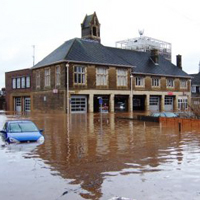Flooding is currently in the news and none of us can fail to be moved by the devastation and misery caused to people who've seen their homes almost literally washed away. For many of them it's a double blow with their businesses suffering too - loss of stock, records, computers and other equipment not to mention lost revenue and staff salaries which still have to be found. Yes of course that's what insurance is for, but can a cheque (not always immediately forthcoming) really cover the true toll?
The upheaval isn't instantly sorted either as it can take up to 12 months for a property to dry out and then structural assessments have to be made. The Association of British Insurers (ABI) says the average flood damage cost to homes is between £20,000 and £40,000, but in the West Midlands floods of 2007 the average business insurance claim was £100,000.
All businesses should as a matter of course have comprehensive contingency plans, but small businesses, stretched so many ways financially can find it hard to safeguard themselves adequately and data back-up and security often don't get the attention they should until it's too late. What would be the impact on your business of losing all accounting and payroll data?
Practical steps to help ensure your business is as well-prepared as it can be:
1. Understand your risk. Knowing the true extent of the risks and resultant potential losses will help you establish priorities and an action plan. Ensure this is reviewed and kept up-to-date, not least to refresh memories; response drills can help save lives and limit damage should the worst happen. Any crisis plan should also include a record of key information such as contacts. A hard copy should be kept in a secure and separate location and a copy kept online on a web based programme as opposed to just on your computers.
2. Think Ahead. Insure your business equipment and ensure your information is equally well-protected. After all equipment is replaceable, information isn't always! Regularly back-up computer data off-site.
Preferably use SaaS (Software as a Service) web-based products for business-critical functions like HR, Payroll and Accounts. SaaS-based software is hosted online rather than on-premises, so it's always password accessible via internet browser from anywhere, using any computer. Not only does this protect your data, but it means business can continue despite the loss of an office location.
3. Making the most of your insurance cover. Make sure you have insurance that adequately reflects your risks. In the event of a crisis, check with your provider before throwing anything away or commencing repair work: their loss adjuster will want to assess and investigate the entire scene as it stands. Engage in dialogue: insurers may be willing to make an interim payment to help you get your business going again as quickly as possible.
Businesses often don't fully understand their policies and could miss opportunities to claim. For example, premises don't necessarily have to suffer damage to claim on Business Interruption insurance. If a business has Denial of Access cover, they may have a claim for income loss because they can't gain access to their premises (ie compromised transport links). Retailers may also have cover for Loss of Attraction, which applies if there is a reduction in footfall due to a local crisis.
4. Plan your recovery and identify all available support. For example, at the moment the Federation of Small Businesses is offering interest-free loans of up to £5,000 to help cover costs associated with maintaining and rebuilding businesses affected by flooding.
For more information please visit www.e-conomic.co.uk






